Iran's state media journalist detained in Israel, says IRIB chief
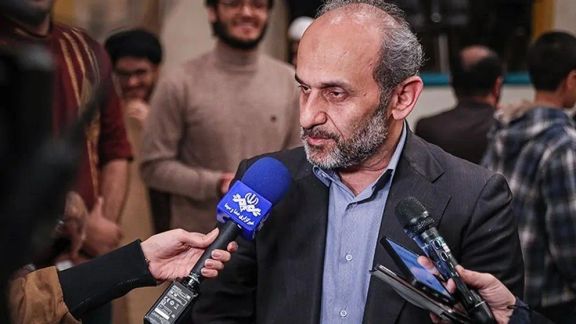
The head of Iran's state broadcaster said on Tuesday that one of its journalists has been detained by Israel.

The head of Iran's state broadcaster said on Tuesday that one of its journalists has been detained by Israel.
"Based on our follow-up efforts, this journalist has been imprisoned and captured by the Zionist regime," Iran's official ISNA quoted Peyman Jebelli as saying.
He said that the family did not wish for the matter to be made public, emphasizing that the journalist remains in captivity in Israel, not Gaza.
Without disclosing the journalist’s identity, or the timing of the detention, Jebelli expressed hope that the journalist would be freed from captivity soon.
Israeli officials have not yet made any announcements or confirmed the detention of the unnamed journalist affiliated with the Iran and it is unclear how he could have entered the Jewish state with whom Iran has no diplomatic ties.
Since the outbreak of the Gaza conflict, Israel has imposed restrictions on foreign journalists entering Gaza. The Israeli High Court ruled in January 2024 that the ban on foreign journalists entering Gaza could continue, citing ongoing security concerns.
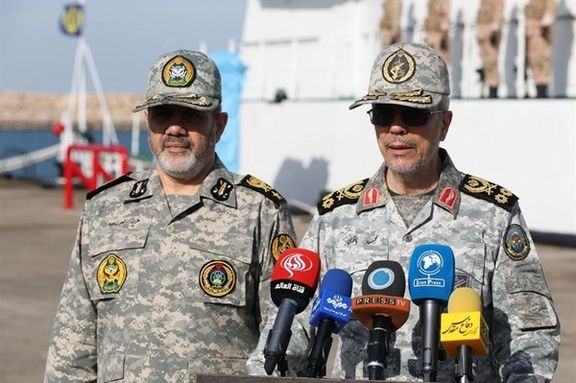
The Chief of Staff of Iran's Armed Forces said on Tuesday that the country's military is fully prepared for any potential conflict, including in the domain of cyber warfare.
"We are ready for any confrontation, and we are prepared to respond to threats in the field of cyber warfare," IRGC-affiliated Tasnim news quoted Mohammad Bagheri as saying following the final phase of a large-scale military exercise in western Iran.
The fighting talk comes as US President Donald Trump promises a maximum pressure approach on Iran with the new premier not denying that he will give the green light to Iran's archenemy Israel to target the country's nuclear facilities.
Bagheri spoke of the country's focus on technology as the attention now moves beyond the conventional battlefield, including attack and defense drones.
"Due to the development and promotion of artificial intelligence and robotics, modern battles are significantly different from those in the past," he said.
"Accordingly, the Army’s Ground Forces maximized the use of these two technologies during the exercise in the western region, and with the equipment produced by the Army's Research and Self-Sufficiency Organization, the robotic operations were executed and assessed."
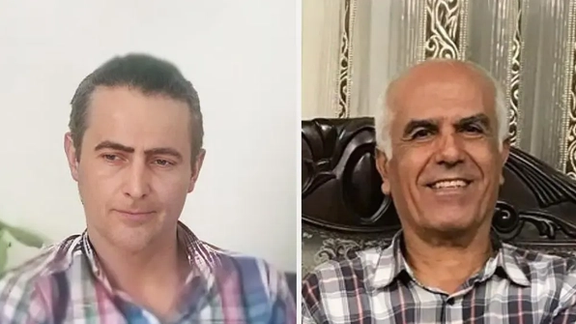
Amnesty International has raised alarm over the imminent risk of execution faced by two political prisoners following their transfer from Tehran’s Evin prison to Ghezel Hesar prison in Alborz province on Sunday.
"Their grossly unfair trial was marred by allegations of torture and forced confessions," Amnesty said in a statement Monday.
Behrouz Ehsani, 69, and Mehdi Hassani, 48, had their death sentences upheld by Iran's Supreme Court earlier this month.
Mostafa Nili, a lawyer representing Ehsani, said on Monday that the Supreme Court had ordered a temporary halt to Ensani's execution.
"Today, along with my esteemed colleague Mr. Babak Paknia, we visited the Supreme Court branch. We learned that the branch, in accordance with the law, issued an order yesterday to halt the execution of Mr. Behrouz Ehsani Aslamlou's sentence. The sentence will not be carried out until the review of the retrial request is completed," Nili wrote in a post on X.
No such announcement has been made regarding Hassani, leaving his fate uncertain.
According to Norway based rights group, Iran Human Rights (IHR), the two men were arrested at the height of Iran's nationwide Woman, Life, Freedom protests in 2022 sparked by the death in custody of Mahsa Amini.
IHR said Ehsani and Hassani were notified of their death sentences on the second anniversary of the protests in September 2024. According to IHR the two men were sentenced to death on charges of baghy (armed rebellion) and moharebeh (enmity against god) through “membership in Mojahedin Organisation [MEK] and collecting classified information.”
“In recent days, officials of the Islamic Republic have linked the murders of Judges Moghiseh and Razini to MEK, paving the way for the execution of prisoners associated with the organisation," said IHR director Mahmood Amiry-Moghaddam in a statement.
"For this reason, the risk of these prisoners' execution is very serious. We call on the international community, human rights organisations, and the people of Iran to increase the political cost of these executions through their efforts," he added.
Judges Mohammad Moghiseh and Ali Razini, assassinated in Tehran on January 18, had decades-long histories of handing down death sentences and lengthy prison terms to dissidents in numerous cases.
According to Amnesty, Ehsani was held in solitary confinement for 50 days in section 240 of Evin prison, where agents pressured him to make forced confessions under psychological torture, including threats of flogging, execution, and harm to his family, which he resisted. He was later moved to section 209 for 75 days before being transferred to a general ward.
Similarly, Hassani was held in solitary confinement for six months and forced to write self-incriminating statements under torture. According to Amnesty both men were denied contact with their families during these periods.
Amnesty urged Iranian authorities to halt the executions immediately and quash their convictions and sentences.
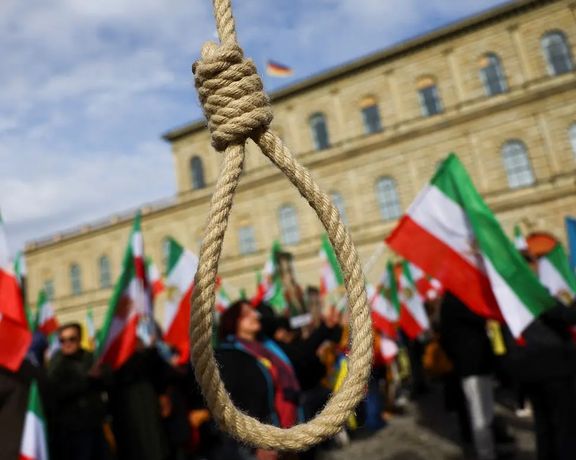
The United States for the first time ever spared Iran criticism for its human rights record at the 48th Session of the Universal Periodic Review (UPR) of the United Nations Human Rights Council (UNHRC) in Geneva on Friday.
It is an unprecedented move that is considered significant by human rights advocates, saying this could show disregard for Iran's human rights violations.
The UPR is an essential mechanism of the council aimed at improving the human rights situation for member states. Iran is one of 14 states reviewed by the UPR working group.
Based on log records, the United States has filed recommendations on the Islamic Republic since 2010, expect for this year.
Iran did face criticism this year from other member states including the United Kingdom, Sweden, Switzerland and Paraguay, denouncing the country’s treatment of women, its high rate of executions and crackdown on dissidents.
Ukraine took aim at Iran for supplying Russia’s war in Ukraine with drones and missiles. Germany condemned Tehran for committing gender discrimination and suppressing basic freedoms, urging the government to put an end to the death penalty.
Why the UPR matters
Human rights activists use the UPR to advocate for change and expose Iran’s human rights abuses on an international platform. The withdrawal of the United States from making recommendations is a blow to human rights advocacy, Nazanin Afshin-Jam an Iranian-Canadian activist told Iran International.
“I am shocked and devastated by this news,” said Afshin-Jam “We rely on Western liberal democracies, especially countries like the United States that champion human rights and freedoms, to act as moral compasses in holding regimes accountable."
Afshin-Jam, the founder of the Iranian Justice Collective (IJC), used to run an organization called Stop Child Executions, which focused on ending the execution of juveniles around the world. Part of their work included submitting findings to the UPR process, a critical tool for exposing human rights violations.
"The idea of the U.S. not submitting its findings on the Islamic Republic of Iran’s blatant and egregious human rights abuses is unprecedented. This is not the moment to pull back; it’s the moment to push forward and ensure accountability," she said.
Iran International has reached to the US State Department for a response and did not hear back in time for this report.
"Not a good sign"
Taimoor Aliassi , the UN representative of Kurdistan Human Rights Association in Geneva, told Iran Interantional he feels deceived by the US, which is breaking from its long-standing tradition of championing human rights.
“This is not a good sign for human rights,” said Aliassi, “The situation of human rights and minority rights is worsening in Iran. There’s a dramatic increase in the number of executions. It is really important for the United States to take this into consideration if they really want to deal with Iran and to make improvements or if they really intend to support the Iranian people.”
Prior to the UPR meeting in Geneva, Shadi Amin, the Director of 6rang, an Iranian Lesbian and Transgender network, lobbied member states to advocate for Iran’s LGBTQ community.
Nine member states urged Iran to not criminalize homosexuality, which is considered a crime punishable by death in Iran, but the United States, according to Amin is not a country Iranians should rely on anymore.
“The Iranian human rights community should try not to count on the US government in the future. The grassroots communities need to stand up and do something, because that's not acceptable what they [the US administration] are doing,” said Amin.
Iran’s delegation, led by Deputy Minister for International and Legal Affairs at the Ministry of Foreign Affairs Kazem Gharibabadi, took to the podium Friday, saying that significant progress had been made to improve the lives of Iranians. Gharibabadi also referred to any criticism as politically motivated.
In 2024, The United Nations Fact Finding Mission said it uncovered murders, torture and rape, accusing Iran of committing crimes against humanity.

The new CIA director John Ratcliffe is a vocal proponent of a firm stance against Iran who has called on Washington to follow Israel’s lead in dealing with Tehran.
Ratcliffe was the Director of National Intelligence during Trump's first term in office and a prominent voice on national security in the United States. He has said on many occasions that he sees the theocracy in Tehran as a grave threat to both US interests and stability in the Middle East.
In an interview with Fox News last November, Ratcliffe slammed the Obama administration’s approach to Iran, calling it naïve in its reliance on diplomacy to curb Tehran's ambitions.
That approach underestimates “the lethality and evil nature of the Iranian regime,” he said, backing in its stead, Donald Trump’s policy of maximum pressure. Perhaps more notably, he called on the US government to assist Israel in employing what he described as a foot-on-the-throat approach against Tehran.
Ratcliffe’s call for coordinated US-Israeli action against Iran underscores his belief that Tehran’s nuclear program and its support for regional armed groups are existential threats that demand forceful collective action.
This aligns him with those in the intelligence and foreign policy circles who reject diplomatic solutions and say the Islamic Republic responds to strength only. It could, however, point to a potential divergence with President Trump, who has indicated that he would seek a deal before considering other options.
Another disagreement between the two could emerge from the president’s decision to remove security details of former officials, including Mike Pompeo, John Bolton and Brian Hook, who have allegedly faced death threats from Iran over their roles in Trump’s previous administration that killed IRGC’s top commander Qassem Soleimani.
This move has been criticized as dangerous, potentially leaving these individuals vulnerable to Tehran’s retaliation. It may not directly pertain to Ratcliffe’s policy stance on Iran, but it does suggest that Trump’s actions this term could not fully align with the hardline approach that both he and Ratcliffe have previously endorsed.
Overall, Ratcliffe’s stance on Iran is largely in harmony with President Trump’s, both championing a hardline approach, particularly on Tehran’s nuclear program.
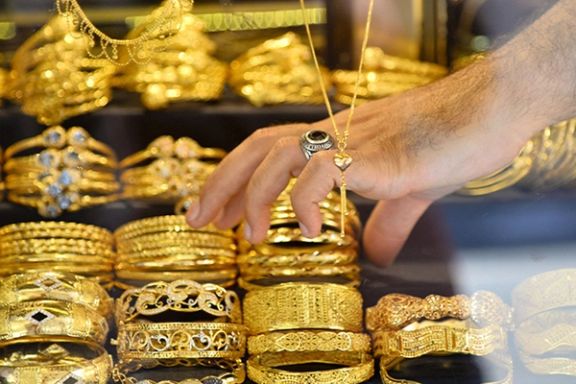
Online gold-selling platforms are gaining traction in Iran, offering fractional ownership of the precious metal as an accessible option for those grappling with financial instability.
The platforms, heavily advertised across Tehran, target lower-income individuals seeking to protect their dwindling savings amidst a falling currency that wipes out their cash savings.
With gold prices soaring to approximately 55 million rials per gram, many Iranians now find traditional methods of purchasing gold increasingly out of reach.
For decades, gold has served as a trusted form of savings and financial security, especially during economic crises. However, with the average worker earning just above 100 million rials per month ($130) and living costs rising sharply, purchasing even a small amount has become unattainable.
The platforms’ promise of affordability has drawn interest but also skepticism. Mizan News Agency, affiliated with the Judiciary, has warned that “fake sales and fraud are among the dangers lurking for gold buyers via online platforms.”
Public trust remains low, partly due to past scandals like the 2016 collapse of Samen Coins, a gold trading company that embezzled 150 trillion rials, devastating thousands of customers and deepening fears about the trustworthiness of online sales.
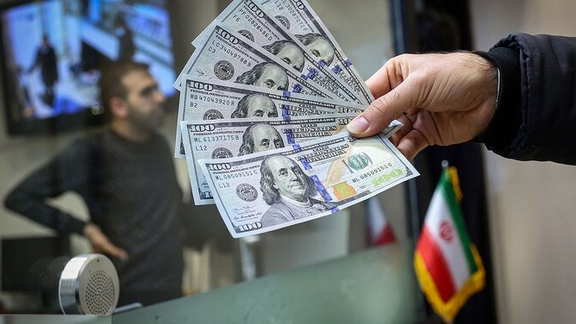
The company engaged in fake sales, selling assets it did not possess, leading to widespread financial losses. The scandal prompted public outrage and legal action, resulting in the arrest and prosecution of key figures. It also highlighted significant regulatory weaknesses in Iran's financial oversight, particularly of online trading platforms, and eroded public trust in such services.
The uncertainty about the platforms is further exacerbated by the relentless depreciation of the rial. Despite hopes that the dollar’s upward trend would stabilize following Donald Trump's comments of resolving Iran issue without military conflict, the US dollar has surged to approximately 850,000 rials, breaking new records. Economic expert Ali Sadeghin notes that while negotiations between Iran and the US remain uncertain, inflationary expectations continue to drive the dollar’s rise.
Sadeghin explained to Titre-Avval-e Eghtesad website, “If negative news is injected into the market, the dollar's price will move to a higher threshold. Overall, the dollar could rise above its current level.”
The broader impact of the economic crisis extends beyond finance. Sociology professor Zahra Ojagh observed that rising poverty and currency devaluation are eroding social trust and increasing conflict. “When a society becomes poorer, healthy interactions decline, leading to heightened mistrust and conflict,” she added.